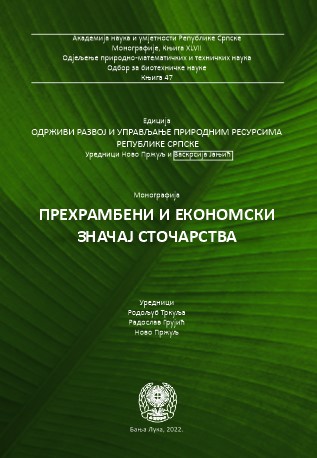Possibilities of horse-breeding sustainable development
DOI:
https://doi.org/10.7251/EORU2204377TKeywords:
The state of equine breeding, sustainable development, Republic of SrpskaAbstract
Up until the middle of the 20th Century equine breeding was considered an industry that directly reflected the national wealth and status of any given country. Since then, due to the upheaval of mechanisation the number of horses gradually declined, primarily in Europe. The recorded declining numbers concerning draft horse breeds are particularly alarming, in comparison to breeds used for sport and recreation which have increased notably during the last thirty years or so. Thus it can also be remarked how the numbers and quality of horses in many European countries like Slovenia and Croatia had improved noticeably. However, in Bosnia and Herzegovina, horse breeding practices continue to deteriorate: the numbers of these magnificent creatures plummet progressively. Former state stud farms are being shut down and the once abundant population of autochthonous Bosnian mountain horses have reached a breaking point. The Arab, Lipizzan and cold blooded horse breeds have met a similar fate. Despite that, horses do hold an important position in the folk traditions of Bosnia and Herzegovina, especially with the people of the Republic of Srpska. The people cherish numerous traditions in relation to these animals and genuinely care for horses, which is how and why the horse breeding industry lives on - nurtured by the enthusiasm of individuals. Equine breeding is not economically unsustainable, on the contrary, its economical significance is in fact great in developed countries. Sustainable development possibilities can be sought in equestrian sports certainly, but also in tourism, recreational practices, hippotherapy, landscape maintenance (pastures), the production of mare milk, etc. Observing the economic potential of the equine industry which includes trade and consumerism, employment opportunities, food production, the related pharmaceutical and equestrian equipment industry, as well as services, it becomes clear that it’s in the absolute interest of the state to stop and reverse the negative horse breeding trend. Moreover, it is essential to keep in mind that the preservation of the autochthonous horse breeds and stud farms, developed throughout the decades, is beneficial not only for the obvious economic reasons, but for the sake of heritage and culture, as well as the conservation of folkcustoms and traditional values in general. The autochthonous horse breeds could be used in all of these areas. This effort, the conservation of autochthonous genetic resources, requires state support. With the support of the state, by promoting professional equine breeding practices primarily in relation to selection and veterinary care, the decline of horse populations may be overturned which would consequently rehabilitate the horse breeding industry, and additionally contribute to the conservation of agrobiodiversity and autochthonous animal resources, environmental protection, and reverse the depopulation of rural municipalities through means of undeniable economic potential.
